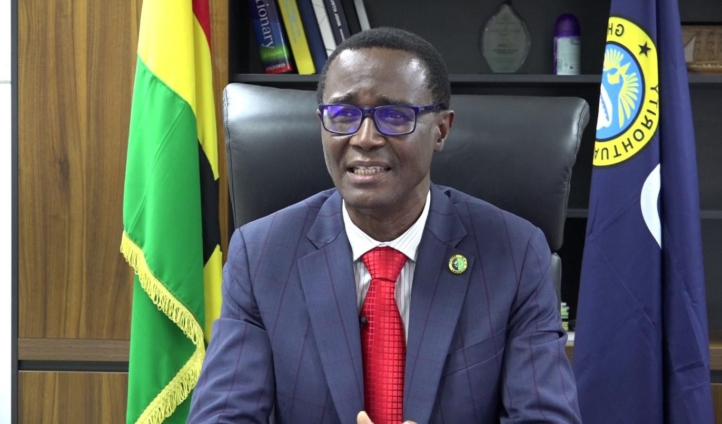The Commissioner General of the Ghana Revenue Authority (GRA), Rev. Dr. Ammishaddai Owusu-Amoah has defended the decision to tax the owners of ride hailing vehicles.
According to him, placing the Vehicle Income Tax (VIT) on owners of ride hailing vehicles is part of measures to expand the tax net.
“It’s important that we deepen and widen the tax net, and if there are businesses and industries not captured, everything must be done to bring them on board”, he said.
Dr. Owusu-Amoah noted that the GRA has being implementing new strategies to help bring on board businesses that have moved into the E-Commence space onto the tax bracket.
He disclosed this on PM EXPRESS BUSINESS EDITION with host George Wiafe, which will be aired on Thursday December 28, 2023 at 9 pm on the Joy News Channel.
Background
The GRA in a statement announced that ride-hailing vehicle owners will pay a new tax, known as the Vehicle Income Tax (VIT) which will take effect from January 1, 2024.
In a notice issued by the authority, it said the levy is in accordance with Section 22 of Regulations 2016, LI 2244 which indicates that “any commercial vehicle owner that earns income from the operation of a commercial vehicle shall pay income tax quarterly”.
The authority, therefore, urged ride-hailing companies operating in Ghana – Uber, Yango and Bolt – to update their digital platforms to incorporate the new tax requirements.
GRA and resolve to widen tax net
Dr. Owusu-Amoah stated that the GRA has to be innovative to collect the right taxes for development.
“Most businesses and enterprises have been moving their services into the E-Commence space and we need to find innovative ways to capture their services for tax purposes”.
“I think it’s not fair that, normal commercial vehicle operators are paying their Vehicle Income Tax on their operations, however owners of Ride-hailing Vehicles are not captured”.
Dr. Owusu-Amoah said the GRA has heard the concerns and complains about not doing enough to widen the tax net.
This, he maintained motivated the Authority to begin such initiatives as part of mechanisms to expand the tax net.
He revealed that the GRA is also working to bring on board the informal sector, especially artisans.
E-Commerce and revenue mobilisation
Dr. Owusu-Amoah revealed that since the GRA started issuing the E-Commence Registration, revenue collection has picked up strongly.
“We have mobilised almost a billion cedis from the E-Commerce sector since last year”, he disclosed.
2024 tax revenue target
The GRA is expected to mobilise about ₵136 billion in taxes to the state as captured in the 2024 Budget.
Dr. Owusu-Amoah was optimistic the GRA will be able to achieve the target.
“We have laid the right foundation that will support revenue mobilisation in the coming months” he assured.
He also revealed that the IMF programme includes initiatives that supports aggressive domestic revenue mobilisation.
Latest Stories
-
Ghana’s railway sector has been revived under my leadership – Akufo-Addo
17 mins -
Next government must enforce C190 – Women Economic Dialogue Forum
22 mins -
NCCE engages party youth activists at Nandom on peaceful election
24 mins -
SSNIT engages stakeholders on its operations
26 mins -
Defilement: 19-year-old farmer jailed ten years, with hard labour
27 mins -
Bawumia to inaugurate new headquarters of Lands Commission on November 25
29 mins -
Sylvester Tetteh denies demolishing GBC staff bungalow
34 mins -
Signing of peace pact by presidential candidates slated for November 28
42 mins -
Akufo-Addo reiterates commitment to free and fair elections
44 mins -
Climate change impact poses threat to Ghana’s financial stability – BoG Governor
47 mins -
Ursula Owusu-Ekuful assures of leading NPP to victory in Ablekuma West
50 mins -
Akufo-Addo urges armed forces to maintain neutrality, professionalism
57 mins -
Driver jailed 15 years for robbery
1 hour -
Election 2024: Bawumia is a timely asset for NPP and Ghana – Freddie Blay
1 hour -
Livestream: Newsfile discusses Ghana’s 2025 AFCON fiasco, Dumsor scare
1 hour

